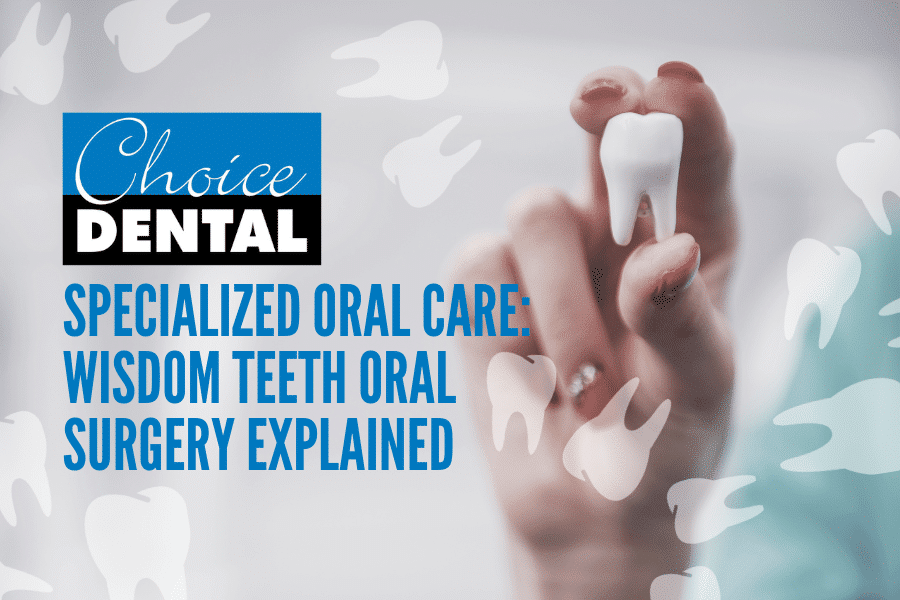What you Need to Know About Wisdom Teeth Surgery
Get wise about wisdom teeth! Join Dr. Charlie Sung of Choice Dental as he provides an overview of wisdom teeth surgery. From explaining what wisdom teeth are to why surgery is often required, Dr. Sung eases any anxiety or concerns you may have. Additionally, he explains how to prepare for your procedure and the essential steps to care for yourself afterward. If you have an upcoming procedure, or are simply curious about your teeth, this is the right episode for you!
What You’ll Learn:
- What are wisdom teeth and when you should see a dentist about getting them removed
- Why it’s crucial to consult a suitably trained dentist or oral surgeon ensuring a successful outcome
- How to prepare for your wisdom tooth surgery including consulting with your surgeon and pre-operative instructions
Specialized Oral Care - Wisdom Teeth Oral Surgery Explained
Dr. Charlie Sung:
Hi everyone, this is Dr. Charlie Sung from Choice Dental. Today we’re gonna be talking about wisdom teeth oral surgery, and just the common questions being asked around wisdom teeth and the things that like people wanna know the most. So firstly, we’re gonna have an in-depth look at what wisdom teeth are and the potential complications that they can cause. So basically, wisdom teeth are also called the third molars. They are the third molar to come through into the mouth. And this usually occurs around the age of 18 to 25 years of age in most people. Now, when this wisdom tooth comes through into the mouth, what happens is that commonly there’s not enough room. So when there’s not enough room for the wisdom tooth to come through, the wisdom tooth can get stuck. It can come through sideways or like maybe there’s a bit of gum that covers the wisdom tooth and that gum can get easily infected. So that gum that’s partially covered covering the wisdom tooth is can get infected by the bacteria in our mouths or food can get stuck underneath that flap of gum and eventually that can cause a lot of pain and distress for the patient. So that’s the most common complication regarding wisdom teeth. Some of the lesser known complications regarding wisdom teeth are if they’re stuck in the jawbone and they’re impacted, which means that they don’t have enough room to come through. And these wisdom teeth can also, very rarely, but it does happen, they can develop some cysts and tumors. So these cysts and tumors are painless. They don’t hurt until a lot of the bone in the jawbone has been eaten away. So yeah, that’s why it’s very important to take regular X-rays and do regular checkups with the dentist. So these problems regarding with wisdom teeth, cysts and tumors can be picked up before it’s too late.
So in terms of treating the wisdom tooth, if it has been decided it needs removal, so this needs careful planning by an appropriate dentist or oral surgeon. And then so planning involves taking a very detailed head scan x-ray, sometimes an additional x-ray called a cone beam x-ray is required to further image the wisdom tooth so that we can plan any wisdom tooth surgery appropriately. And then from there, the wisdom tooth surgery is carried out to remove the wisdom tooth in a safe manner that doesn’t damage any surrounding structures like nerves or the jawbone or things like that.
So the next topic I wanna talk about is the importance of seeing an appropriately trained dentist or oral surgeon for the removal of wisdom teeth. Now, the reason it’s important is because there are nerves and delicate structures that commonly surround wisdom teeth. And so the surgery of removing the wisdom tooth needs to be taken with a lot of care so that these delicate structures are not damaged in the process. So some of these structures include like a nerve that runs in the jawbone that gives feeling to people’s taste, their lip, their chin, and some of the side of their face.
The importance of consulting an appropriately trained dentist or an oral surgeon regarding wisdom teeth can’t be understated because there are very important structures that surround wisdom teeth that need to be looked after during the surgery so that they don’t get damaged. Some of these structures include a nerve that runs in the jawbone that gives feeling to the tongue, your lip, your chin, and the taste sensation. And so these this nerve needs to be protected as much as possible and as best as possible for the successful wisdom tooth surgery to happen.
Now, in terms of preparing for a wisdom tooth surgery, the best thing you can do is to firstly, be very well informed about the benefits and the risks of having the procedure in the first place. So this involves a thorough consultation with the dentist or oral surgeon before the procedure, so that everyone is aware of you know, the consent process and like what to expect and the risks and benefits of, I guess, of having this procedure being done.
So in terms of the recovery of wisdom teeth, like after the procedure has been done, like the best thing you can do is to like not eat, drink or rinse for the next four hours after leaving the dental office. This is so we can leave the surgical area undisturbed during the initial hours when the blood clot and the healing process is the most fragile. And for the next seven days, just being aware that, you know, mild pain is, is normal. And that can, it can be quite easily managed with like some painkillers such as Panadol and Neurofin together. Only take Neurofin if you’re allowed to take Neurofin. If a doctor has been, has told you not to take Neurofin, please do not take Neurofin. But in most cases people can take Panadol and Neurofin and taking them together is the best combination. In some other circumstances, we will prescribe some stronger pain relief and we can give you that on the day of the procedure. The other things you can do to help the healing process is after the wisdom tooth has been removed, is placing an ice pack on your cheek, just 20 minutes on, 20 minutes off just to reduce any swelling and inflammation. And that will help the healing process and just preventing that sort of swollen appearance. And it can also reduce the onset of any bruising and things like that, which is all completely normal after a wisdom tooth surgery. All of these sorts of things like a temporary kind of common symptoms after having an oral surgery, which generally are gone five to seven days after the procedure has occurred.
And so the other thing that you can do is to keep the surgical area very clean for the seven days after the wisdom tooth has been removed. This can be done by rinsing your mouth with salty water after every meal and snack. The reason for this is like the most common cause of problems regarding wisdom tooth healing after a surgery has been done is food getting stuck into the hole of once of the surgical site. So basically flushing out any food that potentially can go into that hole regularly and thoroughly using salty water is a great idea. And if you do that for the next five to seven days, it will help the healing quite a lot.
All right, great. So those are the top points about wisdom teeth surgery and things that people ask me the most. I hope that was useful. So yeah, my name is Dr. Charlie Sung from Choice Dental. Have a great day.












